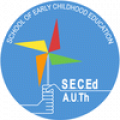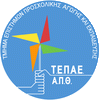Undergraduate Studies
The Praktikum (Internship Programme) is an important and compulsory part of student education at SECEd. It is designed and supervised by a designated Internship Committee.
According to the Curriculum, the Internship Programme includes two compulsory extended courses, which involve Professors of various disciplines and SECEd Laboratory Teaching Staff:
- Early Childhood Pedagogy and Practice Ι (24 ECTS)
- Early Childhood Pedagogy and Practice ΙΙ (24 ECTS)
Early Childhood Pedagogy and Practice Ι
The course is divided into 3 Phases. Each phase has distinct learning purposes and outcomes.
After the successful completion of Phase A, students will be able to:
- Understand the kindergarten classroom as a learning environment
- Acknowledge preschoolers as learners
- Identify factors that affect the quality of the learning environment
- Familiarise themselves with tools for observing and documenting children’s learning and development
- Interpret documentation using pedagogical theories and approaches
- Acknowledge the educational process as an exploratory process
- Familiarise themselves with the reflective process for reviewing and transforming their teaching and learning choices
- Cooperate with the classroom teacher and their Professors and tutors
- Pay attention and constantly consult the relevant literature
- Follow the rules of the school and respect its culture
- Keep the practicum diary
After the successful completion of Phase B, the students will be able to:
- Communicate effectively with children
- Create a positive learning environment
- Select or even design appropriate educational material according to the needs of the children
- Design learning experiences taking into account: the children’s different needs, the classroom conditions, contemporary pedagogical principles and approaches and the State Curriculum for the kindergartens
- Implement learning experiences and be able to adapt them according to children’s needs.
- Interpret and assess the educational process
- Reflect critically on teaching and learning
- Cooperate with the classroom teacher and their Professors and Tutors
- Pay attention and consult the relevant literature
- Follow the rules of the school and respect its culture
- Be formal in their duties as kindergarten teachers
- To keep their practicum diary
After the successful completion of Phase C, students will be able to:
- Reflect critically on teaching and learning using appropriately the relevant pedagogical theories and approaches
- Make self-assessment and identify their achievements and issues needing improvement
- Discuss with their tutors, get and use constructively their feedback
- Complete their assignments
- Pay attention and consult the relevant literature
- Complete their portfolio from their participation in the internship
- Acknowledge the importance of lifelong learning.
Early Childhood Pedagogy and Practice ΙI
Upon successful completion of the course, students are expected to have developed specialized pedagogical, teaching, research, and scientific reasoning concerning different fields in their studies (for instance Science, Mathematics, Arts, and Music). They are also expected to be able to identify commonalities between different fields of knowledge and their particularities as well as to interrelate them, in order to create appropriate learning and social environments for preschool children.
Internship through Operational Programmes (NSRF)
The School of Early Childhood Education has been participating since 2015 in the “Aristotle University of Thessaloniki Internship Programme”, which is co-financed by the European Social Fund (ESF) and National Resources, under the Operational Programme “Human Resources Development, Education and Lifelong Learning 2014- 2020”.
The students of the School have the option to participate in the Internship programme through NSRF, after having successfully completed the courses Early Childhood Pedagogy and Practice I and II in the 6th and 7th semesters respectively, provided that they meet the required criteria (if they are selected), according to Decision No. 14/14-5-2017 of the General Assembly.
Internship through NSRF takes place in companies and private institutions such as Private Kindergartens, Private Daycare Centres in the position of a Kindergarten Teacher, Centres of Creative Activities, as well as in children’s hospitals, museums, theatre groups, camps, SOS Children’s Villages, etc.
Internship through NSRF is paid, takes place in the 8th-12th semester, corresponds to 12 credits (ECTS), has a duration of 2 months, and is not graded. The credits corresponding to the Internship do not count towards the 240 ECTS required to obtain the degree.


